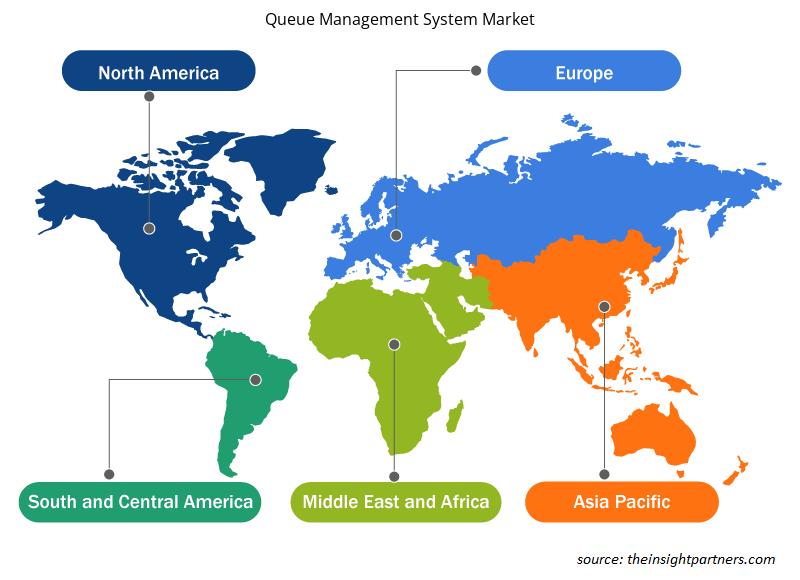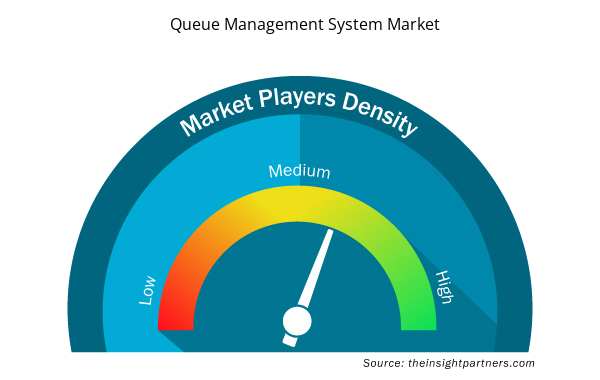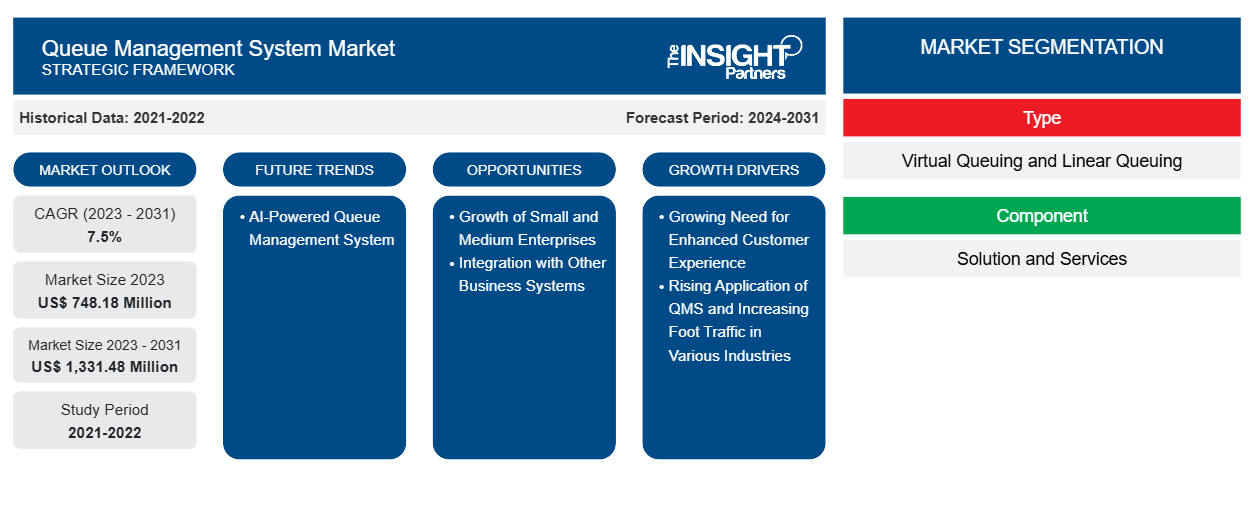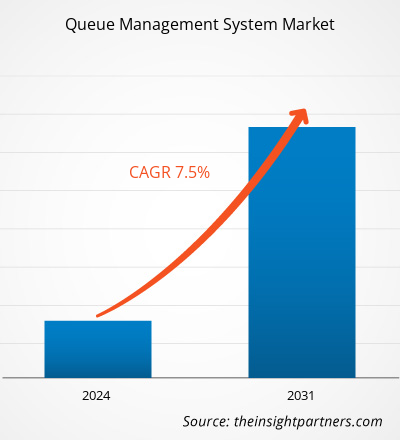排队管理系统市场规模预计将从 2023 年的 7.4818 亿美元增至 2031 年的 13.3148 亿美元。预计 2023-2031 年期间市场复合年增长率将达到 7.5%。对人工智能排队管理系统的需求不断增长,可能会在未来几年为市场带来新的趋势。
排队管理系统市场分析
增强客户体验的需求、QMS 的应用日益广泛以及各个行业的人流量增加等因素正在推动排队管理系统市场的发展。由于中小企业 (SME) 的增长、对虚拟排队管理的需求不断增长以及 QMS 与其他业务系统的集成,预计市场将在预测期内增长。基于人工智能的排队管理系统的兴起是市场的一个主要趋势。此外,基于云的技术的兴起以及虚拟排队和移动售票等先进解决方案的采用改变了组织与客户互动的方式,从而提高了灵活性和效率。医疗保健、零售和银行业是这一增长的主要贡献者,因为他们越来越多地实施 QMS 来处理不断增长的客户量并提高运营效率。此外,这些系统中数据分析的集成提供了有价值的见解,可帮助组织优化其服务流程,最终推动产品采用和市场扩展。
排队管理系统市场概况
队列管理系统 (QMS) 包括用于管理和分析队列中客户或访客流量的工具。该系统旨在通过减少最终用户的等待时间来优化运营效率。队列管理系统可帮助服务提供商增强服务交付、提高员工工作效率并简化排队体验。由于对高效便捷地构建和管理队列的需求不断增加,多年来,队列管理系统市场一直以稳定的速度增长。多年来,队列管理系统的最终用户数量持续激增。该系统是定制的,以满足零售店、BFSI、医疗保健、政府办公室和教育机构的需求。例如,根据国际机场协会 (ACI) 世界的数据,从 2022 年到 2040 年,客运量年均增长率为 5.8%,到 2040 年,每年将有超过 190 亿乘客使用机场。预计这将在预测期内增加机场对队列管理系统的采用。
定制此报告以满足您的需求
您可以免费定制任何报告,包括本报告的部分内容、国家级分析、Excel 数据包,以及为初创企业和大学提供优惠和折扣
- 获取此报告的关键市场趋势。这个免费样品将包括数据分析,从市场趋势到估计和预测。
排队管理系统市场驱动因素和机遇
增强客户体验的需求日益增长
企业越来越认识到,管理客户流量和减少等待时间可以显著提高客户满意度。每次互动,无论是退货、维修还是解决问题,都在塑造客户与企业之间即将建立的关系方面发挥着重要作用。根据 Qtrac 的数据,93% 的消费者表示,当企业提供出色的客户服务时,他们更有可能成为回头客。此外,根据 Zendesk 的数据,73% 的消费者表示,在与某家企业发生几次负面体验后,他们很可能会转向竞争对手。这一统计数据凸显了保持高质量客户服务和持续积极互动的重要性。在竞争激烈的市场环境中,消费者拥有众多选择,企业绝不能忽视客户体验对留存的影响。转换的决定往往不仅仅是关于即时体验,还包括过去互动的累积效应。为了降低失去客户的风险,组织必须主动解决潜在问题,征求客户反馈,并根据反馈实施改进。通过优先考虑优质服务并展示对客户满意度的承诺,企业可以培养忠诚度并降低客户转向竞争对手的可能性。这种优先考虑客户体验的转变正在鼓励组织采用队列管理解决方案。
人口的快速增长是导致医院、零售店、诊所、机场和其他设施排队混乱的主要因素,这会导致人群沮丧并降低服务质量。此外,在高峰时段,排队人数不断增加,工作人员试图手动管理排队,导致服务质量下降。根据米德兰兹技术学院 2022 年 1 月的数据,由于服务质量差和客户不满,公司正在失去潜在客户。数据估计,糟糕的客户服务给企业造成了每年 750 亿美元至 1.6 万亿美元的损失,原因是排队时间长、削减成本的策略、对客户需求缺乏了解以及为了增长而牺牲客户满意度等问题。预计未来几年收入损失将增加,导致客户偏好转向竞争对手的产品,从而导致潜在客户流失。为了有效管理队列并提高服务质量,各个服务提供商都选择了队列管理解决方案。因此,对增强客户体验的需求不断增长推动了排队管理系统市场的发展。
中小企业成长
预计在预测期内,中小企业 (SME) 的增长将为排队管理系统市场的扩张带来巨大的机会。中小企业通常以其敏捷性和适应性为特征,使它们能够比大型企业更有效地开发满足特定客户需求的定制解决方案。2022 年,中小企业占欧盟所有企业的约 99%,它们通常更加敏捷和创新,使它们能够采用 QMS 等先进技术来增强客户体验和运营效率。此外,根据经济合作与发展组织 (OECD) 的数据,2021 年,中小企业在许多国家的经济格局中发挥着至关重要的作用,贡献了约 50% 的总就业率和 40% 的国内生产总值 (GDP)。随着中小企业不断发展并寻求竞争优势,排队管理系统 (QMS) 的采用将会增加,因为这些企业认识到提高运营效率和客户体验的重要性。随着中小企业的扩张,他们面临着客户对快速高效服务的不断增长的期望,因此有效管理客户流量至关重要。排队管理系统为这些企业提供了简化运营、减少等待时间和改善整体服务交付的工具,这对于在竞争激烈的市场中留住客户至关重要。此外,中小企业整合数字解决方案的现象越来越普遍,这使得它们能够实施利用实时数据分析来优化服务流程的高级 QMS。这一趋势提高了客户满意度,并支持中小企业实现更高的生产力和运营效率,最终推动其在市场上的可持续发展。
排队管理系统市场报告细分分析
有助于得出排队管理系统市场分析的关键部分是类型、组件和应用。
- 根据类型,排队管理系统市场分为虚拟排队和线性排队。虚拟排队部分在 2023 年占据了市场主导地位。
- 根据组件,排队管理系统市场分为解决方案和服务。解决方案部分在 2023 年占据了更大的市场份额。
- 从应用方面来看,排队管理系统市场分为 BFSI、医院、零售店、餐厅、公用事业服务提供商和机场、政府办公室等。零售店部分在 2023 年占据了市场主导地位。
排队管理系统市场份额按地区分析
- 排队管理系统市场分为五大区域:北美、欧洲、亚太地区 (APAC)、中东和非洲 (MEA) 以及南美和中美。2023 年,北美占据市场主导地位,其次是欧洲和亚太地区。
- 北美在排队管理系统市场占据主导地位,其次是欧洲和亚太地区。北美市场占据主导地位主要归因于众多终端用户行业的存在。北美排队管理系统市场的发展受到医疗保健、航空和零售业使用率上升的推动。整个地区对医疗保健行业采用先进技术的投资正在迅速增长。根据 JAHANI AND ASSOCIATES LLC 的数据,2022 年,由于 COVID-19 疫情的影响,美国医疗保健行业的资本市场活动有所增加。医疗保健行业获得了 1100 亿美元的投资,用于开发技术以改善医疗保健服务。此外,医疗保健行业约 45% 的交易是并购 (M&A) 交易,由公司进行以开发现有技术。由于就诊患者数量增加,医疗保健行业的扩张正在推动整个地区的市场增长。此外,北美排队管理系统硬件制造商和软件开发商的集中度较高,这使得最终用户可以从各种供应商处采购系统。此外,加拿大和墨西哥的排队管理系统市场也正在迅速普及,因为系统提供商和最终用户的数量都在不断增加。因此,采购率的上升正在推动北美排队管理系统市场的发展。
排队管理系统市场区域洞察
Insight Partners 的分析师已详尽解释了预测期内影响排队管理系统市场的区域趋势和因素。本节还讨论了北美、欧洲、亚太地区、中东和非洲以及南美和中美洲的排队管理系统市场细分和地理位置。

- 获取队列管理系统市场的区域特定数据
队列管理系统市场报告范围
| 报告属性 | 细节 |
|---|---|
| 2023 年的市场规模 | 7.4818亿美元 |
| 2031 年市场规模 | 13.3148亿美元 |
| 全球复合年增长率(2023 - 2031) | 7.5% |
| 史料 | 2021-2022 |
| 预测期 | 2024-2031 |
| 涵盖的领域 | 按类型
|
| 覆盖地区和国家 | 北美
|
| 市场领导者和主要公司简介 |
|
市场参与者密度:了解其对商业动态的影响
排队管理系统市场正在快速增长,这得益于最终用户需求的不断增长,而这些需求又源于消费者偏好的不断变化、技术进步以及对产品优势的认识不断提高等因素。随着需求的增加,企业正在扩大其产品范围,进行创新以满足消费者的需求,并利用新兴趋势,从而进一步推动市场增长。
市场参与者密度是指在特定市场或行业内运营的企业或公司的分布情况。它表明在给定市场空间中,相对于其规模或总市场价值,有多少竞争对手(市场参与者)存在。
在排队管理系统市场运营的主要公司有:
- Q-MATIC 集团
- 深圳市智明科技有限公司
- Q-nomy 公司
- 斯基普利诺
- 韦弗泰克
- Aurionpro 解决方案有限公司
免责声明:上面列出的公司没有按照任何特定顺序排列。

- 获取队列管理系统市场顶级关键参与者概述
排队管理系统市场新闻和最新发展
队列管理系统市场通过收集一手和二手研究后的定性和定量数据进行评估,其中包括重要的公司出版物、协会数据和数据库。队列管理系统市场的一些发展如下所列:
- 研华宣布收购法国公司 Aures Technologies SA,该公司以其 POS 和 KIOSK 品牌而闻名。这一战略举措旨在加强研华在智能零售产品和服务方面的全球覆盖范围,提升其在全球领先的智能零售解决方案提供商中的地位。(来源:研华,新闻稿,2024 年 4 月)
- Wavetec 宣布扩大与旁遮普银行的合作。该银行在其各分行安装了 300 个排队管理系统 (QMS)。(来源:Wavetec,新闻稿,2024 年 6 月)
队列管理系统市场报告覆盖范围和交付成果
“队列管理系统市场规模和预测(2021-2031)”对市场进行了详细的分析,涵盖了以下领域:
- 队列管理系统市场规模以及范围涵盖的所有关键细分市场的全球、区域和国家/地区预测
- 排队管理系统市场趋势以及市场动态,如驱动因素、限制因素和关键机会
- 详细的 PEST 和 SWOT 分析
- 排队管理系统市场分析涵盖主要市场趋势、全球和区域框架、主要参与者、法规和最新市场发展
- 行业格局和竞争分析,涵盖市场集中度、热图分析、知名参与者以及排队管理系统市场的最新发展
- 详细的公司简介
- 历史分析(2 年)、基准年、预测(7 年)及复合年增长率
- PEST 和 SWOT 分析
- 市场规模价值/数量 - 全球、区域、国家
- 行业和竞争格局
- Excel 数据集



Report Coverage
Revenue forecast, Company Analysis, Industry landscape, Growth factors, and Trends

Segment Covered
This text is related
to segments covered.

Regional Scope
North America, Europe, Asia Pacific, Middle East & Africa, South & Central America

Country Scope
This text is related
to country scope.
常见问题
The queue management system market was valued at US$ 748.18 million in the year 2023 and is expected to grow at a CAGR of 7.5% during 2023-2031.
The growing need for enhanced customer experience and the rising application of QMS and increasing foot traffic in various industries are the driving factors impacting the queue management system market.
The key players holding majority shares in the queue management system market include Advantech Co Ltd, Wavetec, Lavi Industries, Q-MATIC Group AB, and Aurionpro Solutions Ltd.
The virtual queuing segment led the queue management system market with a significant share in 2023 and is also expected to grow with the highest CAGR.
Asia Pacific is anticipated to grow with the highest CAGR over the forecast period.
AI-powered queue management system is the future trend of the queue management system market.
The queue management system market is expected to reach US$ 1,331.48 by 2031.
North America held the largest market share in 2023, followed by Europe and Asia Pacific.
Trends and growth analysis reports related to Technology, Media and Telecommunications : READ MORE..
The List of Companies - Queue Management System Market
- Q-MATIC Group AB
- Qminder Ltd
- Q-nomy Inc
- Skiplino
- Wavetec
- Aurionpro Solutions Ltd
- Advantech Co Ltd
- SEDCO Co Ltd
- Lavi Industries
- AKIS Technologies UAB
- WaitWell
- Verint Systems Inc
- QLESS
- OFFTEC Holding Group
- Waitwhile, Inc
The Insight Partners performs research in 4 major stages: Data Collection & Secondary Research, Primary Research, Data Analysis and Data Triangulation & Final Review.
- Data Collection and Secondary Research:
As a market research and consulting firm operating from a decade, we have published and advised several client across the globe. First step for any study will start with an assessment of currently available data and insights from existing reports. Further, historical and current market information is collected from Investor Presentations, Annual Reports, SEC Filings, etc., and other information related to company’s performance and market positioning are gathered from Paid Databases (Factiva, Hoovers, and Reuters) and various other publications available in public domain.
Several associations trade associates, technical forums, institutes, societies and organization are accessed to gain technical as well as market related insights through their publications such as research papers, blogs and press releases related to the studies are referred to get cues about the market. Further, white papers, journals, magazines, and other news articles published in last 3 years are scrutinized and analyzed to understand the current market trends.
- Primary Research:
The primarily interview analysis comprise of data obtained from industry participants interview and answers to survey questions gathered by in-house primary team.
For primary research, interviews are conducted with industry experts/CEOs/Marketing Managers/VPs/Subject Matter Experts from both demand and supply side to get a 360-degree view of the market. The primary team conducts several interviews based on the complexity of the markets to understand the various market trends and dynamics which makes research more credible and precise.
A typical research interview fulfils the following functions:
- Provides first-hand information on the market size, market trends, growth trends, competitive landscape, and outlook
- Validates and strengthens in-house secondary research findings
- Develops the analysis team’s expertise and market understanding
Primary research involves email interactions and telephone interviews for each market, category, segment, and sub-segment across geographies. The participants who typically take part in such a process include, but are not limited to:
- Industry participants: VPs, business development managers, market intelligence managers and national sales managers
- Outside experts: Valuation experts, research analysts and key opinion leaders specializing in the electronics and semiconductor industry.
Below is the breakup of our primary respondents by company, designation, and region:

Once we receive the confirmation from primary research sources or primary respondents, we finalize the base year market estimation and forecast the data as per the macroeconomic and microeconomic factors assessed during data collection.
- Data Analysis:
Once data is validated through both secondary as well as primary respondents, we finalize the market estimations by hypothesis formulation and factor analysis at regional and country level.
- Macro-Economic Factor Analysis:
We analyse macroeconomic indicators such the gross domestic product (GDP), increase in the demand for goods and services across industries, technological advancement, regional economic growth, governmental policies, the influence of COVID-19, PEST analysis, and other aspects. This analysis aids in setting benchmarks for various nations/regions and approximating market splits. Additionally, the general trend of the aforementioned components aid in determining the market's development possibilities.
- Country Level Data:
Various factors that are especially aligned to the country are taken into account to determine the market size for a certain area and country, including the presence of vendors, such as headquarters and offices, the country's GDP, demand patterns, and industry growth. To comprehend the market dynamics for the nation, a number of growth variables, inhibitors, application areas, and current market trends are researched. The aforementioned elements aid in determining the country's overall market's growth potential.
- Company Profile:
The “Table of Contents” is formulated by listing and analyzing more than 25 - 30 companies operating in the market ecosystem across geographies. However, we profile only 10 companies as a standard practice in our syndicate reports. These 10 companies comprise leading, emerging, and regional players. Nonetheless, our analysis is not restricted to the 10 listed companies, we also analyze other companies present in the market to develop a holistic view and understand the prevailing trends. The “Company Profiles” section in the report covers key facts, business description, products & services, financial information, SWOT analysis, and key developments. The financial information presented is extracted from the annual reports and official documents of the publicly listed companies. Upon collecting the information for the sections of respective companies, we verify them via various primary sources and then compile the data in respective company profiles. The company level information helps us in deriving the base number as well as in forecasting the market size.
- Developing Base Number:
Aggregation of sales statistics (2020-2022) and macro-economic factor, and other secondary and primary research insights are utilized to arrive at base number and related market shares for 2022. The data gaps are identified in this step and relevant market data is analyzed, collected from paid primary interviews or databases. On finalizing the base year market size, forecasts are developed on the basis of macro-economic, industry and market growth factors and company level analysis.
- Data Triangulation and Final Review:
The market findings and base year market size calculations are validated from supply as well as demand side. Demand side validations are based on macro-economic factor analysis and benchmarks for respective regions and countries. In case of supply side validations, revenues of major companies are estimated (in case not available) based on industry benchmark, approximate number of employees, product portfolio, and primary interviews revenues are gathered. Further revenue from target product/service segment is assessed to avoid overshooting of market statistics. In case of heavy deviations between supply and demand side values, all thes steps are repeated to achieve synchronization.
We follow an iterative model, wherein we share our research findings with Subject Matter Experts (SME’s) and Key Opinion Leaders (KOLs) until consensus view of the market is not formulated – this model negates any drastic deviation in the opinions of experts. Only validated and universally acceptable research findings are quoted in our reports.
We have important check points that we use to validate our research findings – which we call – data triangulation, where we validate the information, we generate from secondary sources with primary interviews and then we re-validate with our internal data bases and Subject matter experts. This comprehensive model enables us to deliver high quality, reliable data in shortest possible time.


 获取此报告的免费样本
获取此报告的免费样本